<Back to Index>
- President of the French Governmental Commission Fernand de Brinon, 1885
- Leader of the Action Française Charles - Marie - Photius Maurras, 1868
- Minister of Justice Raphaël Alibert, 1887
PAGE SPONSOR
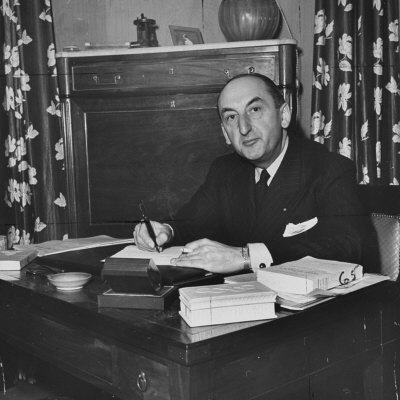
Fernand de Brinon, Marquis de Brinon (26 August 1885 – 15 April 1947) was a French lawyer and journalist who was one of the architects of French collaboration with the Nazis during World War II. He claimed to have had five private talks with Adolf Hitler between 1933 and 1937.
Born into a wealthy family in the city of Libourne in the Gironde département, Ferdinand de Brinon studied political science and law at university but chose to work as a journalist in Paris. After World War I, he advocated a rapprochement with Germany. He became friends with Joachim von Ribbentrop.
Ferdinand de Brinon married Jeanne Louise Rachel Franck, a.k.a. Lisette, the Jewish former wife of Claude Ullmann; she converted to Catholicism. By her, Brinon had two stepsons.
The Brinons became leading socialites in 1930s Paris, and close friends of the political right wing elite. A leading advocate for collaboration following France's defeat by Germany in World War II, in July 1940 Brinon was invited by Pierre Laval, Vice Premier of the new Vichy regime, to act as its representative to the German High Command in occupied Paris. In 1942, Philippe Pétain, head of the Vichy regime, gave him the title of Secretary of State.
As the third ranking member of the Vichy regime and because of his enthusiastic support for the fascist cause, Brinon's importance to the Nazis was such that he was able to obtain a special pass for his Jewish born wife that exempted her from deportation to a German concentration camp. With the march of the Allied Forces towards Paris in 1944, Brinon and his wife fled to Germany. There, Brinon became in September 1944 president of the French Governmental Commission, Vichy's government - in - exile. He was eventually arrested by the advancing Allied troops. He and his wife were both held in Fresnes prison but she was eventually released.
Fernand de Brinon was tried by the French Court of Justice for war crimes, found guilty, and sentenced to death on 6 March 1947. He was executed by firing squad on 15 April at the military fort in the Paris suburb of Montrouge.
In 2002, French historian Gilbert Joseph published Fernand de Brinon: L'Aristocrate de la collaboration. In 2004, Bernard Ullmann, Lisette de Brinon's son from her first marriage, broke his 60 year silence and told his family's story in his book, Lisette de Brinon, Ma Mère.
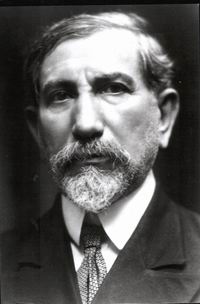
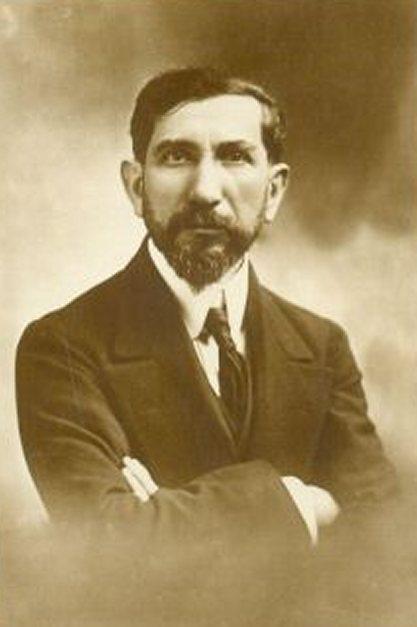
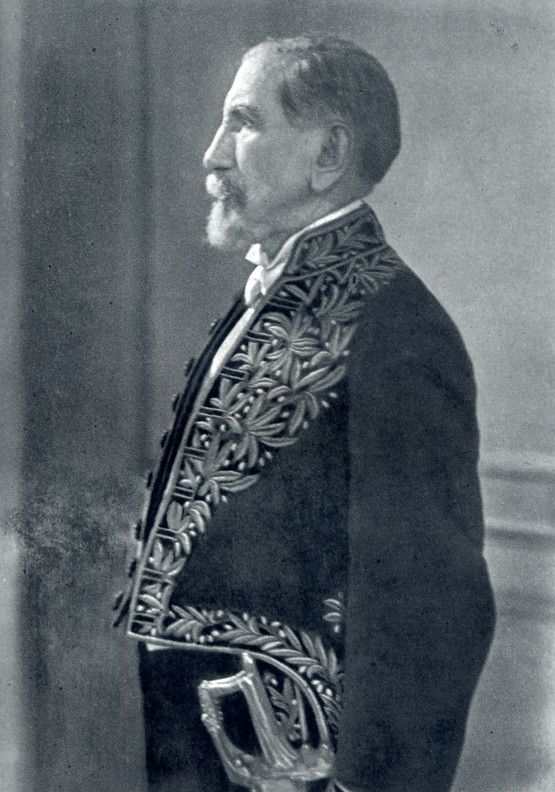
Charles - Marie - Photius Maurras (20 April 1868 – 16 November 1952) was a French author, poet and critic. He was a leader and principal thinker of Action Française, a political movement that was monarchist, anti - parliamentarist and counter - revolutionary. Maurras' ideas greatly influenced National Catholicism and "nationalisme integral". A major tenet of integral nationalism was put forth by Maurras as "A true nationalist places his country above everything". A political theorist, a major intellectual influence in early 20th century Europe, his views anticipated some of the ideas of fascism.
Maurras was born in an old Provençal family, and brought up by his mother and grandmother in a Catholic and monarchist environment. In his early teens he became deaf. Like many other French politicians, he was heavily affected by the defeat during the 1870 Franco - Prussian War. After the 1871 Commune and the 1879 defeat of Marshall MacMahon's Moral Order government, French society slowly found a consensus for the Republic, symbolized by the rallying of the Orleanists to the Republic. In his youth, Maurras was a disciple of the poet Frédéric Mistral and shared the federalist thesis of the Provençal Félibrige movement. He published his first article, at 17 years old, in the Annales de philosophie chrétienne review. He then collaborated to various reviews, including L’Événement, La Revue bleue, La Gazette de France or La Revue encyclopédique, where he praised Classicism and attacked Romanticism.
However, some time in his youth, Maurras lost his faith and became an agnostic over time. At the age of seventeen he came to Paris and started literary criticism in 1887 in the Catholic and Orleanist Observateur. At this time, Maurras was influenced by Orleanism, as well as German philosophy reviewed by Léon Ollé - Laprune, an influence of Bergson, or by the philosopher Maurice Blondel, one of the inspirations of Christian "modernists" who would later become his most bitter opponents. He came to know the Provençal poet Frédéric Mistral in 1888 and shared the federalist thesis of Mistral's Félibrige movement. The same year he met the nationalist writer Maurice Barrès.
In 1890, Maurras approved Cardinal Lavigerie's call for the Rallying of Catholics to the Republic, marking his opposition not to the Republic in itself but to "sectarian Republicanism."
Beside this Orleanist affiliation, Maurras shared some traits with Bonapartism. In December 1887, he demonstrated to the cry of "Down with the robbers!" during the decorations scandal which had involved Daniel Wilson, the son - in - law of the President Jules Grévy. Despite this, he opposed at first the Boulangist movement. But in 1889, after a visit to Maurice Barrès, Barrès voted for the Boulangist candidate; despite his "anti - semitism of the heart" ("anti - sémitisme de coeur"), he decided to vote for a Jew.
In 1894 – 95 he briefly worked in Barrès' La Cocarde (The Cockade) newspaper, although he sometimes opposed Barrès on his views on the French Revolution. La Cocarde supported General Boulanger who almost toppled the Republic in the late 1880s.
During a trip to Athens for the First Olympic Games in 1896, he came to criticize the Greek democratic system of the polis, which he considered doomed because of its internal divisions and its openness towards métèques (foreigners).
He became involved in politics at the time of the Dreyfus affair, appearing at the forefront of the Anti - Dreyfusard side. He supported Colonel Henry's forgery blaming Dreyfus, as he considered that defending Dreyfus weakened the Army and the Justice system. According to Maurras, Dreyfus was to be sacrificed on the altar of national interest. But when the Republican nationalist thinker Barrès accused Dreyfus of being guilty because of his Jewishness, Maurras went a step further, vilifying the "Jewish Republic". While Barrès' anti - Semitism found its roots both in the pseudo - scientific racist contemporary theories and on Biblical exegesis, Maurras decried "scientific racism" in favor of a more radical "state anti - Semitism."
In 1899 he founded the Action Française (AF) review, an offshoot of the newspaper created by Maurice Pujo and Henri Vaugeois the preceding year. Maurras quickly became influential in the movement, and converted Pujo and Vaugeois to monarchism, which became the movement's principal cause. With Léon Daudet he edited the movement's review La Revue de l'Action Française, which in 1908 became a daily newspaper under the shorter title L'Action Française. The AF mixed integral nationalism with reactionary themes, shifting the nationalist ideology, previously supported by left wing Republicans, to the right side of the political field. It found a wide readership during the implementation of the 1905 law on the separation of Church and State. In 1899 he wrote a short notice in favor of monarchy, "Dictateur et roi" ("Dictator and King"), and then in 1900 his "Enquête sur la monarchie" (Investigations on Monarchy), published in the Legitimist mouthpiece La Gazette de France, which made him famous. Maurras also published thirteen articles in Le Figaro in 1901 and 1902, as well as six articles between November 1902 and January 1903 in Edouard Drumont's anti - Semitic newspaper, La Libre Parole.
Between 1905 and 1908, when the Camelots du Roy monarchist league was founded, Maurras introduced the concept of political activism through extra - parliamentary leagues, theorizing the possibility of a coup d'état. Maurras also founded the Ligue d'Action Française in 1905, whose mission was to recruit members for the Action Française, with the aim of establishing the Duc de Guise on the throne.
Maurras then supported France's entry into World War I (even to the extent of supporting the thoroughly republican Georges Clemenceau) against the German Empire. During the war, the Jewish businessman Emile Ullman was forced to resign from the board of directors of the Comptoir d'Escompte after Maurras accused him of being a German agent. He then criticized the Treaty of Versailles for not being harsh enough on the Germans and condemned Aristide Briand's policy of cooperation with Germany.
In 1925 he called for the murder of Abraham Schrameck, the Interior Minister of Paul Painlevé's Cartel des Gauches's (Left - Wing Cartel) government, who had ordered the disarming of the Far right leagues. For this death threat, he was sentenced to a year on parole. He also threatened to death the President of the Council Léon Blum, leader of the Popular Front, in the Action Française of 15 May 1936, underscoring his Jewish origins (he once called him an "old semitic camel".) This other death threat earned him eight months of prison, from 29 October 1936 to 6 July 1937. Fearing Communism, he joined the pacifists' camp and praised the Munich Agreement in 1938, which the President of the Council Édouard Daladier had signed without any illusions. He also wrote in Action Française:
"There are certain conservatives in France who fill us with disgust. Why? Because of their stupidity. What kind of stupidity? Hitlerism. These French "conservatives" crawl on their bellies before Hitler. These former nationalists cringe before him. A few zealots wallow in dirt, in their own dirt, with endless Heils. The wealthier they are, the more they own, the more important it is to make them understand that if Hitler invaded us he would skin them much more thoroughly than Blum, Thorez and Stalin combined. This "conservative" error is suicidal. We must appeal to our friends not to let themselves be befogged. We must tell them: Be on your guard! What is now at stake is not anti - democracy or anti - Semitism. France above all!"
During 1930s – especially after the 6 February 1934 crisis — many of Action Française members turned to fascism, such as Robert Brasillach, Lucien Rebatet, Abel Bonnard, Paul Chack, Claude Jeantet, etc. Most of them belonged to the staff of the fascist newspaper Je suis partout.
Influencing António de Oliveira Salazar's Estado Novo regime in Portugal, Maurras also supported Francisco Franco and, until spring 1939, Benito Mussolini's Fascist regime. Opposing Adolf Hitler because of his germanophobia, Maurras himself criticized the racist policies of Nazism in 1936, and requested an integral translation of Mein Kampf – some of its passages had been censored in the French edition.
After his failure against Charles Jonnart in 1924 to be elected to the French Academy, he succeeded in entering the ranks of the "Immortals" on 9 June 1938, replacing Henri - Robert, winning by 20 votes against 12 to Fernand Gregh. He was received in the Academy on 8 June 1939 by Henry Bordeaux.
Although in June 1940 articles in Action Française signed by Maurras, Léon Daudet and Maurice Pujo praised General Charles de Gaulle, Maurras quickly came to acclaim the fall of the Third Republic, replaced by Marshal Philippe Pétain's Vichy France, as a "divine surprise". Vichy's reactionary program of a Révolution Nationale (National Revolution) was fully approved of by the leader of the Action Française, who inspired large parts of it. The monarchist newspaper was forbidden in the Occupied Zone and under Vichy censorship in the Southern Zone from November 1942. In La Seule France (1941) Maurras argued for a policy of France d'abord ("France First"), whereby France would restore itself politically and morally under Pétain, resolving the root causes in his eyes of France's defeat in 1940, before dealing with the issue of the foreign occupation. This position was contrasted to the attitude of the Gaullists, who fled France and continued the military struggle. Maurras savaged the pre - war French governments for taking an increasingly bellicose position vis a vis Germany at precisely the same time that these governments were weakening France, militarily, socially and politically, thereby making France's downfall in 1940 all but inevitable. Maurras also criticized the 1940 Statute on Jews for being too moderate. At the same time he continued to express elements of his longstanding germanophobia by arguing in La Seule France that Frenchmen must not be drawn to the German model and by hosting anti - German conferences and he opposed both the "dissidents" in London and the collaborators in Paris and Vichy (such as Lucien Rebatet, Robert Brasillach, Pierre Laval, or Marcel Déat). In 1943, the Germans planned to arrest Charles Maurras.
An admirer (before the war) of Charles de Gaulle, who himself had been influenced by Maurras' integralism, he then harshly criticized the General in exile. He later claimed he believed that Pétain was playing a "double game", working for an Allied victory in secret.
Maurras was arrested in September 1944 with Maurice Pujo, and indicted by High Court of Lyon for "complicity with the enemy" on the basis of articles published by Maurras since the war. At the issue of the trial, during which there were many irregularities in the proceedings (such as false dating or truncated quotations), Maurras was sentenced to life imprisonment and deprivation of civil liberties. He was automatically expelled from the Académie Française (a measure included in the 26 December 1944 ordinance). His response to his conviction was to exclaim "C'est la revanche de Dreyfus!" (It's Dreyfus's revenge!) Meanwhile the Académie Française declared his seat vacant instead of expelling him, as it had done for Pétain, sparing him the fate of Abel Hermant and Abel Bonnard. They waited until his death to elect his successor, Antoine de Lévis - Mirepoix, who was himself close to the Action Française and collaborated with Pierre Boutang's La Nation Française monarchist review.
Imprisoned in Riom and then Clairvaux, Maurras was released in March 1952 to enter a hospital, assisted by the writer Henry Bordeaux, who repeatedly asked President of the Council Vincent Auriol to pardon Maurras. He was transferred to a clinic in Tours, where he soon died. Although weakened he collaborated with Aspects de la France, which had replaced the outlawed Action Française review in 1947. In his last days, he returned to the Catholic faith of his childhood.
Central to Maurras' political ideas were an intense nationalism (what he described as "integral nationalism") and a belief in an ordered society based on a strong leadership. These were the bases of his support for both a French monarchy and the Roman Catholic Church. Yet he had no personal loyalty to the house of Bourbon - Orléans, and was a convinced agnostic for nearly all of his adult life.
He formulated an aggressive political strategy, which contrasted with the Legitimists' apathy for political action. He managed to bring together the paradox of a reactionary thought which would actively change history, a form of Counter - revolution opposed to simple conservatism. His "integral nationalism" rejected all democratic principles which he judged contrary to "natural inequality", criticizing all evolution since the 1789 French Revolution and advocated the return to a hereditary monarchy.
Like many people in Europe at the time, he was haunted by the idea of "decadence", partly inspired by his reading of Taine and Renan, and admired classicism. He felt that France had lost its grandeur during the Revolution of 1789, a grandeur inherited from its origins as a province of the Roman Empire and forged by, as he put it, "forty kings who in a thousand years made France." The French Revolution, he wrote in the Observateur Français, was negative and destructive.
He traced this decline further back, to the Enlightenment and the Reformation; he described the source of the evil as "Swiss ideas", a reference to the adopted nation of Calvin and the birth nation of Rousseau. Maurras further blamed France's decline on "Anti - France", which he defined as the "four confederate states of Protestants, Jews, Freemasons and foreigners" (his actual word for the latter being the xenophobic term of métèques). Indeed, to him the first three were all "internal foreigners."
Antisemitism and anti - Protestantism were common themes in his writings. He believed that the Reformation, the Enlightenment, and the eventual outcome of the French Revolution had all contributed to individuals putting themselves before the nation, with consequent negative effects on the latter, and that democracy and liberalism were only making matters worse.
Although Maurras advocated the return of monarchy, in many ways Maurras did not fit into the French monarchist tradition at all. His support for the monarchy and for Catholicism was explicitly pragmatic, as he felt that a state religion was the only way of maintaining public order. By contrast with Maurice Barrès, a theorist of a kind of Romantic nationalism based on the Ego, Maurras claimed to base his views on reason rather than on sentiment, loyalty and faith.
Paradoxically, he admired the positivist philosopher Auguste Comte, like many of the Third Republic leaders he detested, in which he found a counter - balance to German idealism. Whereas the Legitimist monarchists declined to engage in political action, retreating into an intransigently conservative Catholicism and an indifference to a modern world they saw as irredeemably wicked and apostate, Maurras was prepared to engage in political action, both orthodox and unorthodox (the Action Française's Camelots du Roi league frequently engaged in street violence with left wing opponents, as well as Marc Sangnier's Le Sillon). His slogan was the phrase "La politique d'abord!" ("Politics first!"). Other influences included Frédéric Le Play, English empiricists, who allowed him to reconcile Cartesian rationalism with empiricism, and La Tour du Pin.
Maurras' religious views were likewise less than orthodox. He supported the political Catholic Church both because it was intimately bound up with French history and because its hierarchical structure and clerical elite mirrored his image of an ideal society. He considered the Church to be the mortar which held France together, and the chain linking all Frenchmen together. However, he distrusted the Gospels, written, as he put it, "by four obscure Jews", but admired the Catholic Church for having allegedly concealed much of the Bible's "dangerous teachings". Maurras' interpretation of the Gospels and his integralist teachings were fiercely criticized by many Catholic clergy. However, towards the end of his life Maurras eventually converted from agnosticism to Catholicism.
Notwithstanding his religious unorthodoxy, Maurras gained a large following among French monarchists and Catholics, including the Assumptionists and the Orleanist pretender to the French throne, the count of Paris. Nonetheless, his agnosticism worried parts of the Catholic hierarchy and in 1926, Pope Pius XI placed some of Maurras's writings on the Index of Forbidden Books and condemned the Action Française movement as a whole. Seven of Maurras' books has already been placed on this list in 1914 and a dossier on Maurras had been submitted to Pius X. However, unlike Pius XI, he took no action on this dossier.
It should be noted that it was not just his agnosticicm which worried the Catholic hierarchy but that by insisting upon politiques d'abord he questioned the primacy of the spiritual and thus the teaching authority of the Church and the authority of the Pope himself. That this was the heart of the matter is shown by Jacques Maritain's book Primauté du Spirituel. Maritain was associated with L’Action Française and knew Maurras. While his unease with the movement predates the 1926 crisis, it was this which occasioned his split from Maurras and L’Action Française. This papal condemnation was a great shock to many of his followers, who included a not inconsiderable number of French clergy, and caused great damage to the Action Française. It was lifted however in 1939, a year after Maurras was elected to the Académie française.
Maurras is the main intellectual influence of National Catholicism, Far Right movements, Latin Conservatism, and integral nationalism. He and the Action Française have influenced many people and movements including General Francisco Franco, José Antonio Primo de Rivera, António Sardinha, Leon Degrelle, and autonomist movements in Europe. The Christian Democrat Jacques Maritain was also close to Maurras before the papal condemnation of the AF in 1927, and criticized democracy in one of his early writings, Une opinion sur Charles Maurras ou le devoir des catholiques. Furthermore, Maurrassism also influenced many writings from members of the Organisation de l'armée secrète who theorized "counter - revolutionary warfare". In Spain, the Acción Española took not only its far right monarchism but also its name from Maurras's movement.
The influence extended to Latin America, such as in Mexico where Jesús Guiza y Acevedo, was nicknamed "the little Maurras", as well as the historian Carlos Pereyra or the Venezuelan author Vanenilla Lanz, who wrote a book titled Cesarismo democratico (Democratic Caesarism). Others figures influenced include the Brazilian Plinio Corrêa de Oliveira. Maurras' thought also influenced Catholic fundamentalist supporters of the Brazilian dictatorship (1964 – 85) as well as the Cursillos de la Cristiandad (Christian Courses), similar to the Cité Catholique group, which were founded in 1950 by the bishop of Ciudad Real, Mgr. Hervé. The Argentine militarist Juan Carlos Onganía, who overthrew Arturo Illia in a military putsch in 1969, as well as Alejandro Agustín Lanusse, who succeeded Onganía after another coup, had participated in the Cursillos de la Cristiandad, as did also the Dominican militarists Antonio Imbert Barrera and Elías Wessin y Wessin, chief of staff of the military and an opponent of the restoration of the 1963 Constitution after Rafael Trujillo's overthrow. In Argentina his influence was also felt among the nationalist writers of the 1920s and 1930s such as Rodolfo Irazusta and Juan Carulla.
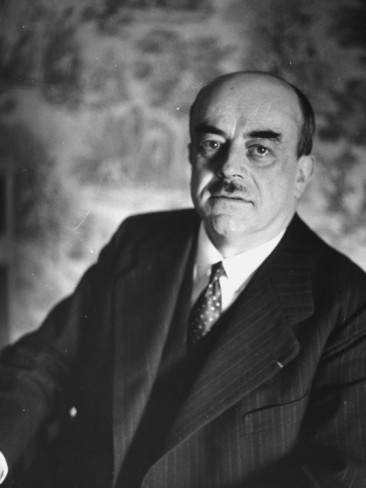
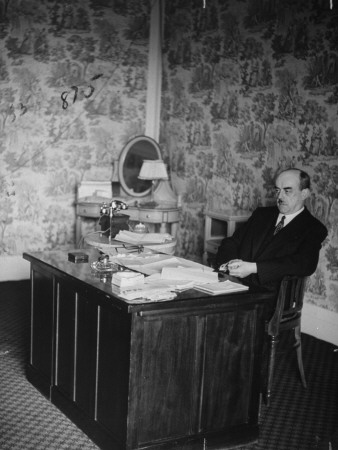
Raphaël Alibert (Saint - Laurent, Lot, 17 February 1887 – 5 June 1963 in Paris) was a French politician.
Raphael Alibert was an ardent Roman Catholic convert and someone with strong royalist ideas. One of the most intense followers of Charles Maurras, Alibert was elected to the Chamber of Deputies for the Action Française party. In October 1939 he and Henry Lémery had visited Maréchal Petain to discuss in private the make-up of a possible ministry with him.
In the French government's new Cabinet formed on 16 June 1940 he was appointed Under Secretary of State to the Prime Minister, now Pétain. He was one of the opposition within the Cabinet to removing the government to North Africa after the Armistice with Germany, and it is said that he was instrumental in preventing the departure by President Albert Lebrun and Camille Chautemps on 20 June 1940, although General Weygand, also opposed to a move, had already urged Lebrun to remain until the evening. In the event only 30 deputies and just one senator departed.
Alibert was responsible for Exposé des motifs, his document forming the basis for the Révolution Nationale, a proposition which the Chamber and Senate adopted on the 9 July 1940. Contrary to post war opinions, Otto Abetz, the German Ambassador in Paris, saw clearly that "nothing could have been further from fascism, whether of the Italian or German variety, than the Revolution Nationale". Abetz felt instead that the government at Vichy believed in "reactionary, hierarchical principles" and that its "nationalism was dangerous to the European concept of the New Order". The following day Pétain signed three 'Constitutional Acts' drafted by Alibert. the first announced that he himself was taking over the functions of the 'French State', in other words that he was becoming 'Head of State'. The second gave the Head of State complete and overall power, both executive and legislative. The third adjourned the Chamber of Deputies and the Senate sine die; they could only be reconvened by Order of the Head of State. Laval remarked that Pétain had been granted more powers than Louis XIV. Pétain, however, maintained that he never wished to assume the mantle of a Caesar, and that he only wanted to serve until a Peace Treaty with Germany had been signed and he could retire.
Alibert was made Keeper of the Seals (Garde des sceaux) from 12 July 1940 to 27 January 1941, and was appointed Minister of Justice in the new Cabinet formed on 13 July 1940, during the time the government was removed to Vichy.
On 22 July he instituted a review of all naturalizations since 1927. This resulted in 15,000 people, including 600 Jews, having their French citizenships revoked and being made stateless.
In keeping with the ideals of Action Francaise, he promulgated the law dissolving secret societies (Freemasonry among others) on 13 August 1940, aided in this project by other devout Catholics, notably Bernard Fay, administrator of the Bibliothéque Nationale, and Robert Vallery - Radot. Their task was to root out about 15,000 Masonic dignitaries from public life, as part of an effort by militant right wing Christians to displace, while taking revenge on, their 'secularizing' enemies.
The new government took a serious anti - semitic position, and he also promulgated the first Statut des Juifs (Statute on Jews) of October 1940 which excluded Jews from certain Civil Service posts and presaged action against those in the so-called liberal professions.
The German Ambassador to France, Otto Abetz, wrote to von Ribbentrop on 8 October 1940 saying that "some (French) ministers, such as Alibert, Baudouin and Bouthillier, are hoping for an eventual restoration of the Bourbons". By mid - November that year Alibert, Yvres Bouthillier, Paul Baudouin, Marcel Peyrouton (Minister of the Interior), Jean Darlan and General Huntziger were putting pressure upon Pétain to have Pierre Laval dismissed from office, in which they were successful on 13 December. A furious Abetz visited Pétain calling for Laval's reinstatement and the dismissal of the plotters against him, including Alibert, to no avail. However, on 9 February 1941 Alibert and Pierre - Etienne Flandin were both dismissed from the government, "probably as a sop to the Germans".
At the end of the war, Alibert fled abroad into hiding, and was condemned to death in absentia on 7 March 1947. Living in exile in Belgium, he was finally given amnesty in 1959, four years before his death from natural causes.